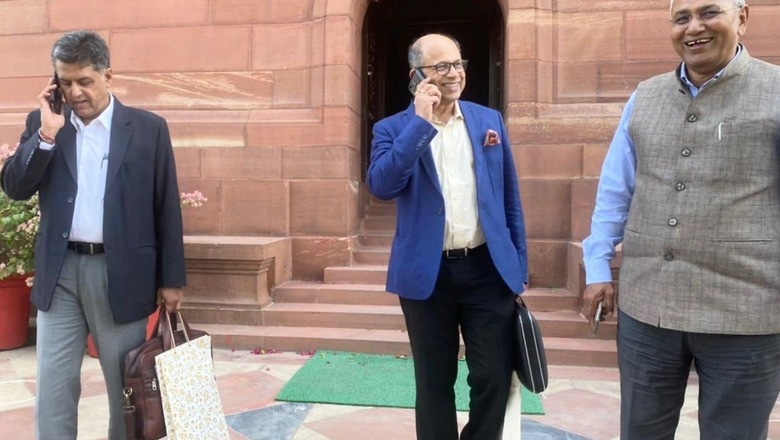
views
The much-awaited report on the data protection bill will finally be presented before the upcoming winter session of parliament after the joint committee adopted it on Monday. The report took several rounds of meetings and much deliberation, government sources said. The winter session is scheduled to begin on November 29.
Sources said the committee has proposed over 200 amendments, 170 of which have been proposed by chairperson PP Chaudhary, Lok Sabha MP. The bill is now being called data protection bill instead of personal data protection bill, as data refers to personal as well as non-personal. It also involves issues of national security, sovereignty and integrity of the country.
The committee did a deep study of the proposed legislation that is likely to have a global impact. Sources told CNN-News18 that 150 countries were waiting to see India form its new data protection law.
Chaudhary told CNN-News18, “We are in the process of forming a law that will have a global impact and will be of international standards. We have given a lot of time for discussion and talked about each clause to everyone’s satisfaction.”
Once the report is presented in parliament, the cabinet is likely to approve it before beginning the discussion about it for it to become a law.
Earlier, the committee was headed by Lok Sabha MP Meenakshi Lekhi, who handed it over to Chaudhary after she became an MoS. Lekhi had conducted over 100 hours of meetings over the bill, while Chaudhary held 12 meetings of 40 hours.
Will there be any dissent
While a couple of opposition MPs considered submitting dissent notes, largely the entire committee has unanimously adopted the report. Congress MPs Jairam Ramesh and Manish Tewari as well as TMC MPs Mahua Moitra and Derek O’Brien are considering dissent. Sources said BJP MP Amar Patnaik had also raised objections, but considering changes in the bill he is unlikely to go ahead with a dissent note.
Patnaik’s objection was that there was no provision in the bill for state data protection authorities. In the absence of the same, there could be a possibility of a number of state versus Centre issues coming to the fore, especially with the implementation of the act. Thereby, state data protection authority would be important to safeguard the interest of the state and its stakeholders.
What are the objections
According to Clause 57, the bill processing or transferring of personal data in violation of the rules would be punishable with a fine of Rs 15 crore of 4 per cent of global turnover of the company, whichever is higher and a penalty of Rs 5 crore or 2 per cent of the annual turnover in case of minor delinquencies. This clause faced objections from several members. Now, the committee has recommended that the government should be authorised to form the rules for the penalty not exceeding the previous cap of Rs 15 crore or 2 per cent turnover or in minor breaches of Rs 5 crore or 4 per cent.
Many MPs in the committee objected to Clause 35, according to which central government and central law enforcing agencies are exempt from the act and can process data without seeking any permission to safeguard the safety of the state, sovereignty of the nation and for friendly relations with foreign nations.
Several members in the opposition, including Jairam Ramesh, objected to this clause stating that this will give the Centre and its agencies a free run, leading to cases of misuse. Thus, opposition MPs said it was important that every time such a sanction was sought for any law enforcement agency, it would be vital for a recording of the reasons to be presented before parliament.
The chairperson and other members of the ruling BJP argued that in cases as serious as involving the safety and security of the nation and its sovereignty and integrity, it would not be feasible or possible or advisable to put such sensitive information before the public or even in parliament. Finally, the committee has recommended that the government will be required to frame rules and procedures for the exercise of such power, sources said.
Several MPs attended the meeting to adopt the report. Apart from Chaudhary, Jairam Ramesh, Manish Tewari, Sudhanshu Trivedi, Vinay Sahasrabuddhe, Rajyavardhan Singh Rathore, Gourav Gogoi, Amar Patnaik among others were also present.
Background
The bill, which was introduced as the personal data protection bill, 2019, in the Lok Sabha by electronics and information technology minister Ravi Shankar Prasad in December that year, underwent parliamentary scrutiny upon insistence from members of the House.
In February 2020, the committee invited suggestions and views from the public as well as experts, stakeholders and organisations. This feedback was compiled and shared with the IT ministry. Misnistry officials, stakeholders including Google, Facebook, Twitter, Amazon, Nasscom, Truecaller, Ola, Uber and Reserve Bank of India, have also made representations before the committee.
Read all the Latest Politics News here



















Comments
0 comment